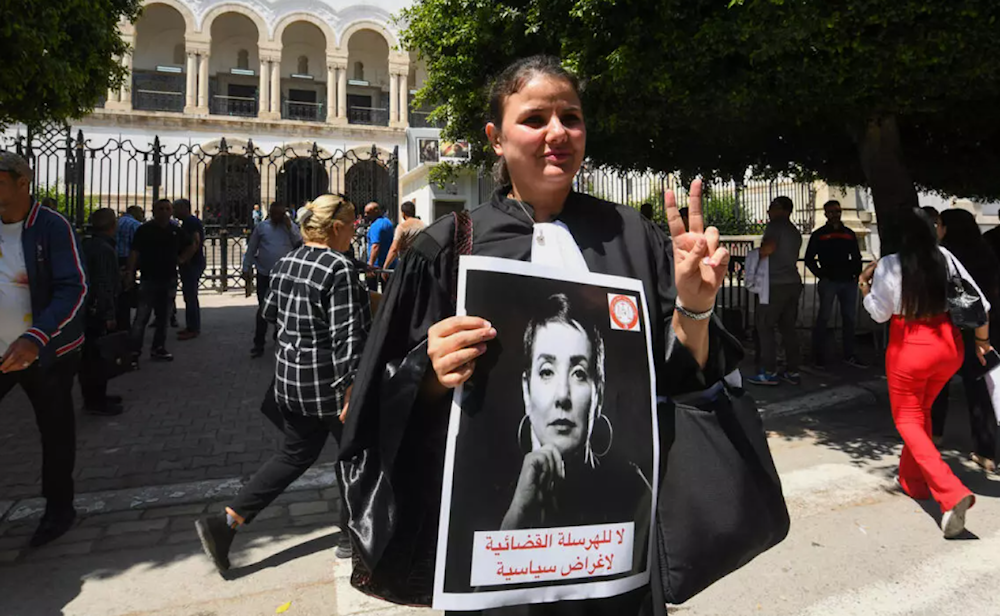Tunisia lawyer critical of president receives two-year prison sentence
Sonia Dahmani was arrested last year after making televised remarks that questioned Tunisia’s approach to undocumented African migrants.
-

Lawyers protesting in front of the Tunis Court, on May 13, 2024 (AFP)
Sonia Dahmani, a prominent Tunisian lawyer and vocal critic of President Kais Saied, was sentenced to two years in prison on Monday in a case that human rights groups say highlights an intensifying crackdown on dissent in Tunisia.
Dahmani was convicted over comments she made criticizing government policies toward sub-Saharan African migrants. Her legal team condemned the ruling, arguing that she is being prosecuted twice for the same remarks, a violation of legal norms.
"This is a grave injustice," said lawyer Bassem Trifi, while fellow attorney Sami Ben Ghazi called the proceedings "a farce", citing the judge’s refusal to adjourn the session, which led to the defense team's withdrawal from the trial.
Controversial cybercrime law, Decree 54, invoked
Sonia Dahmani was arrested last year after making televised remarks that questioned Tunisia’s approach to undocumented African migrants, a comment that later led to charges under the country’s controversial cybercrime law, Decree 54, which has drawn sharp criticism from both local and international rights groups.
Since President Kais Saied’s 2021 power grab, when he dissolved parliament and began ruling by decree, numerous opposition leaders, journalists, and critics have been imprisoned, in what the opposition has labeled a coup. Saied, however, insists his actions are legal and necessary to restore order and combat entrenched corruption.
Rights organizations argue that Tunisia, once seen as a democratic beacon following the 2011 Arab Spring revolution that toppled dictator Zine El Abidine Ben Ali, has now become an “open-air prison,” with the judiciary and security forces being used to suppress dissent.
Saied has repeatedly denied these accusations, claiming that the law is applied equally to all, regardless of political affiliation or status.
Tunisian Court sentences ex-President Marzouki to 22 years in absentia
A Tunisian court on Friday handed a 22-year prison sentence in absentia to former President Moncef Marzouki on charges of undermining state security. The ruling has triggered renewed concern among opposition groups and rights advocates, who denounce what they describe as a "systematic campaign" to silence critics of President Kais Saied.
Marzouki, who served as Tunisia's president from 2011 to 2014, has long been a staunch critic of Saied. He accuses the current president of dismantling Tunisia's democratic institutions after assuming sweeping powers by dissolving parliament in July 2021 and ruling by decree, moves widely condemned by civil society and international observers as a de facto coup.
Saied defended the measures as necessary to "restore stability and order" amid prolonged political deadlock and economic decline. Since then, Tunisia has seen a steady erosion of judicial independence, with dozens of judges dismissed and many more sidelined or placed under executive control.
In response to the court ruling, Marzouki wrote on his official social media page: "To those judges, I say: Your rulings are void, and you are void... You will be tried. Democracy will return."
He added that the new sentence adds to two earlier convictions, eight years and four years also issued in absentia, bringing the total to 34 years behind bars.
"The garbage judges issued a sentence of 22 years in prison against me... In their generous spirit, they handed the same verdict to Imed Daïmi and Dean Kilani as part of a surreal series of rulings targeting Tunisia's finest men—rulings that continue to provoke global ridicule," Marzouki posted on X.

 4 Min Read
4 Min Read









